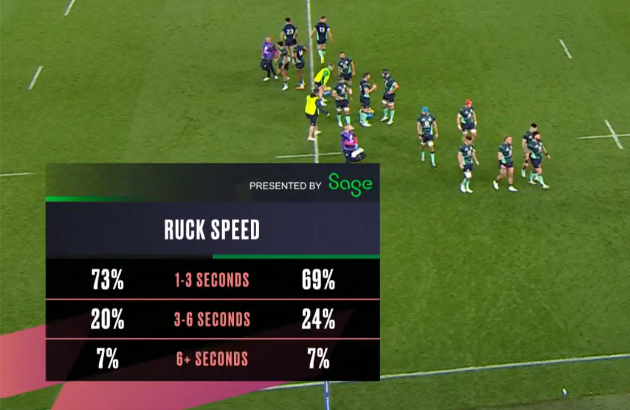LIMERICK’S REPUTATION AS a great rugby city is founded in the glory days at Thomond Park and on famous clubs like Shannon, Garryowen, and Young Munster.
And now there’s a modern twist adding to the sense of Limerick as a home of rugby, as we discovered on a visit to the Treaty City last Friday.
The new six-story International Rugby Experience building looms impressively over O’Connell Street and is set to give people a very interactive rugby offering when it opens its doors in the New Year. The pride around Limerick at the new development, heavily driven by JP McManus, is palpable.
It was the venue for a conference delivered by Stats Perform, a sports tech company who provide data to teams, media, and the betting industry. Stats Perform operate around the world but have a large office in Limerick where their stated aim was to have 60 full-time and 280 part-time staff by the end of this year.
The Opta branch of Stats Perform collects the data that many unions and teams in rugby work with. There’s more that the company does – video production, editorial work, software offerings – but their Opta data is at the core of it all. Most rugby fans will have come across this stuff at some stage, whether flashing up on their TV screens or on the stats pages of various websites.
The theme of last week’s event was ‘Data Innovation in Rugby’ and it was revealing to see just how far analysis and data collection in rugby has come from the days when unfortunate souls had to do it all from VHS tapes. Stop, rewind, play, stop, rewind, play… it must have been torturous stuff.
The whole field of stats and data in rugby lags behind other professional sports but Stats Perform’s Steve Cliffe explains that things are changing quickly, particularly in the media and among supporters. We’ve all probably noticed the increase in stats being used on-screen and by commentators.
Goal-kicking and win probability rates, ruck speed, kick and pass distance, and 22 entry stats are becoming more common, with plenty more coming down the line, such as expected points, game plan data, possession states, and even information generated by artificial intelligence.
“Everyone has to enrich the broadcast and inform the audience, whereas before it was just play the game and the guy was has been a coach would talk about it,” says Cliffe, who is Stats Perform’s senior vice president of sales.
“The graphics technology has improved too. Before, it wasn’t real-time or you had one guy recording 10 stats. Now you can do display data really quickly and you can visualise it.
“The other part is the commercialisation. As the rights fees have gone up, the broadcaster wants a return on investment. We’re seeing that data is a way to bring advertisers in.
“So in the Autumn Nations Cup, you’re seeing them use Sage Insights. That’s content we’re providing and Sage have sponsored, it’s badged by them. That need to make money on the sport because people have paid loads for the rights has been interesting for us.”
The likes of the BBC and BT Sports are clients of Stats Perform, while they also provide data to many of the world’s leading teams. Ireland are among those who dig into the Opta database to supplement their own analysis work.
In the past, the gap between the statistics provided to fans and those actually in use by professional teams has been very wide but Cliffe says it has started to close up now as savvy supporters demand more.
“What you’re seeing now is that fans want that level of information as well,” says Cliffe.
“What the team performance people are doing is driving some of what the fans, audience, and broadcasters see. Team performance isn’t just the secret squirrel not telling anyone what they’re doing.
“The other part of this is the ‘fanalytics’ piece. We have these armchair pundits who don’t work in sport but might be really capable at data or presentation and they’re interpreting information they get in the public domain and creating new stories.
“We’re seeing a lot of rise of those characters in rugby now, it’s been there in football for a few years. There’s people now who have created their persona from an analyst view. That’s only going to improve and it’s good for the game.”
On that point, Cliffe stresses that ‘broadcast’ no longer just means TV and streaming.
“The definition of broadcast has changed,” he says. “We’re seeing more people wanting to create or monetise sport not just in the traditional broadcaster sense, be it podcasts, YouTube channels, websites.
“We’re seeing it more and more and it becoming more accessible. We’ve had to adapt. Previously if you wanted to do a broadcast graphic, you had to buy expensive software whereas now you can use Canva, Powerpoint, or other software. It’s become more and more accessible. More people are creating livings from commentating on the game now, not just the traditional broadcasters.”
The entrance of private equity groups into rugby is part of the acceleration of data and stats, which Cliffe is certain is still in its infancy.
“I’m 18 years in this, starting from collecting data on VHS.
“What we’re seeing is people more and more engaged but we’re still at the start of the journey. The investment everyone is making and the fight for attention means it has to grow.”
It will be fascinating to see where rugby’s data revolution takes us. Here’s hoping it means more new jobs in Limerick along the way.
Get instant updates on your province on The42 app. With Laya Healthcare, official health and wellbeing partner to Leinster, Munster and Connacht Rugby.



